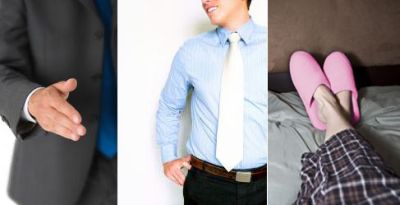I know. It’s nothing new. Work attire has been devolving for years now, in addition to office environments and professional communications.
In fact, I’m part of the problem. From the very moment I entered the corporate world 5 and 1/2 years ago, I was completely unable to keep up a sense of professional decorum. My business attire became business casual, before eventually becoming an odd mix of too much cleavage + too much frump. My work e-mails were breezy and flip. I couldn’t bring myself to wear dress pumps (I figured black sneakers were close enough…).
Still, those who have work to offer are still appreciators of traditional practices, and an adherence to these practices nowadays can make eager professionals stand out from the rumpled crowd.
After all, aren’t we supposed to be dressing for the job we want, and not just the one we already have? (she says, as her toes dig into the fleece lining of the boot slippers her brother bought her for Christmas…)
After the jump, how to retain your spunky sense of self (we’re freelancers for a reason, after all…) while still maintaining an air of professionalism:
Communication Practices:
This is one that occurred to me as I was reviewing apps for an open blogger position.
Let me know if you find this old-fashioned, but I believe that a cover letter is an important representation of self, whether you’re applying to a job, pitching a magazine, or sending out a more general letter of interest. As such, these letters should be well-crafted, thorough, professional, and written in a tone that you feel reflects your understanding of the recipient.
These days, letters are looking lazier — more flippant, riddled with typos, hastily put together. Whether you personally know the recipient of your letter, know somebody who knows somebody, or consider the job to have less value, or be less than ideal, your letter should show the same care as a letter specially crafted to impress.
The same applies to e-mails, phone calls etc. They should be taken seriously. Otherwise, why should anyone take you seriously?
Attire:
I don’t know if it was the frumpy cardigan sweaters and zip-up hoodies, the “dress” sneakers, or the v-neck tops, but every evaluation I received from this one publisher of mine back in the day contained a gentle suggestion for a snappier dress code. He told me it would make me look more mature, and help my authors respect me more.

Similarly, Kate from Stylista (yes, I totally watched it) was excorciated for her low-cut, form-fitting tops. Throughout the season, she was painted as an immature, brainless bimbo, whose every original idea was automatically devalued because of her appearance.
It’s difficult to tell what’s appropriate nowadays, judging from the countless articles from the New York Times alone (see here and here). In my opinion, though, it’s all about common sense. When you’re participating in a business meeting or other face-to-face consultation, you should look neat, clean, and tailored. The rest of the time (assuming you’re working from home), I see no problem with slippers!
Tone:
I find that maintaining a good, friendly rapport with clients is a great way to create positive business relations. There is such a thing, however, as being too friendly:
- Remember that certain topics are off-limits when it comes to the office environment — politics, religion, sex, etc. — due to the possibility of offending others.
- Blurring the line between the personal and the professional also introduces the risk of unrealistic expectations when it comes to your business transactions. After all, why should a client who considers himself your friend have to wait in line — or pay full price — like everyone else?
- The use of a brisk, businesslike tone also engenders trust and respect.
Self-Discipline:
Part of it was the fact that we had no one but ourselves to answer to. Another part was the fact that we were doing nothing but socializing. There’s no question about it…the lax rules at a previous job of mine made it impossible to get anything done, despite (or because of) the fun I was having.
This is the same reason that working from home is difficult for so many.
It’s imperative that you run your at-home business like any other business (except for the one described above…). Your schedule is now flexible, and can be arranged depending upon your own personal needs, but it’s still a schedule, and should be generally adhered to. Others should respect the sanctity of your office hours, and of your home office. And for the love of god, you have to cut back on the gchatting and the tweeting, at least when you’re embroiled in a big project!
…
Is there anything I’m missing here? Are there any other business traditions you’re still clinging on to, as those around you become more and more blase? I’d love to hear about which side of the fence you’re currently sitting on.


[…] students start work immediately after finishing their exams in the spring, some find the transition from student life to working adult difficult. Although most students and new grads have the skills and potential to fulfill their job […]